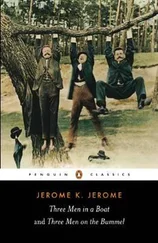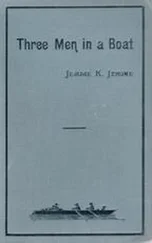Jerome Jerome - Three Men in a Boat (To Say Nothing of the Dog)
Здесь есть возможность читать онлайн «Jerome Jerome - Three Men in a Boat (To Say Nothing of the Dog)» — ознакомительный отрывок электронной книги совершенно бесплатно, а после прочтения отрывка купить полную версию. В некоторых случаях можно слушать аудио, скачать через торрент в формате fb2 и присутствует краткое содержание. Жанр: Юмористическая проза, Классическая проза, на английском языке. Описание произведения, (предисловие) а так же отзывы посетителей доступны на портале библиотеки ЛибКат.
- Название:Three Men in a Boat (To Say Nothing of the Dog)
- Автор:
- Жанр:
- Год:неизвестен
- ISBN:нет данных
- Рейтинг книги:3 / 5. Голосов: 1
-
Избранное:Добавить в избранное
- Отзывы:
-
Ваша оценка:
- 60
- 1
- 2
- 3
- 4
- 5
Three Men in a Boat (To Say Nothing of the Dog): краткое содержание, описание и аннотация
Предлагаем к чтению аннотацию, описание, краткое содержание или предисловие (зависит от того, что написал сам автор книги «Three Men in a Boat (To Say Nothing of the Dog)»). Если вы не нашли необходимую информацию о книге — напишите в комментариях, мы постараемся отыскать её.
Three Men in a Boat (To Say Nothing of the Dog) — читать онлайн ознакомительный отрывок
Ниже представлен текст книги, разбитый по страницам. Система сохранения места последней прочитанной страницы, позволяет с удобством читать онлайн бесплатно книгу «Three Men in a Boat (To Say Nothing of the Dog)», без необходимости каждый раз заново искать на чём Вы остановились. Поставьте закладку, и сможете в любой момент перейти на страницу, на которой закончили чтение.
Интервал:
Закладка:
At Abingdon, the river passes by the streets. Abingdon is a typical country town of the smaller order - quiet, eminently respectable, clean, and desperately dull. It prides itself on being old, but whether it can compare in this respect with Wallingford and Dorchester seems doubtful. A famous abbey stood here once, and within what is left of its sanctified walls they brew bitter ale nowadays.
In St. Nicholas Church, at Abingdon, there is a monument to John Blackwall and his wife Jane, who both, after leading a happy married life, died on the very same day, August 21, 1625; and in St. Helen's Church, it is recorded that W. Lee, who died in 1637, "had in his lifetime issue from his loins two hundred lacking but three." If you work this out you will find that Mr. W. Lee's family numbered one hundred and ninety-seven. Mr. W. Lee - five times Mayor of Abingdon - was, no doubt, a benefactor to his generation, but I hope there are not many of his kind about in this overcrowded nineteenth century.
From Abingdon to Nuneham Courteney is a lovely stretch. Nuneham Park is well worth a visit. It can be viewed on Tuesdays and Thursdays. The house contains a fine collection of pictures and curiosities, and the grounds are very beautiful.
The pool under Sandford lasher, just behind the lock, is a very good place to drown yourself in. The undercurrent is terribly strong, and if you once get down into it you are all right. An obelisk marks the spot where two men have already been drowned, while bathing there; and the steps of the obelisk are generally used as a diving-board by young men now who wish to see if the place really IS dangerous.
Iffley Lock and Mill, a mile before you reach Oxford, is a favourite subject with the river-loving brethren of the brush. The real article, however, is rather disappointing, after the pictures. Few things, I have noticed, come quite up to the pictures of them, in this world.
We passed through Iffley Lock at about half-past twelve, and then, having tidied up the boat and made all ready for landing, we set to work on our last mile.
Between Iffley and Oxford is the most difficult bit of the river I know. You want to be born on that bit of water, to understand it. I have been over it a fairish number of times, but I have never been able to get the hang of it. The man who could row a straight course from Oxford to Iffley ought to be able to live comfortably, under one roof, with his wife, his mother-in-law, his elder sister, and the old servant who was in the family when he was a baby.
First the current drives you on to the right bank, and then on to the left, then it takes you out into the middle, turns you round three times, and carries you up stream again, and always ends by trying to smash you up against a college barge.
Of course, as a consequence of this, we got in the way of a good many other boats, during the mile, and they in ours, and, of course, as a consequence of that, a good deal of bad language occurred.
I don't know why it should be, but everybody is always so exceptionally irritable on the river. Little mishaps, that you would hardly notice on dry land, drive you nearly frantic with rage, when they occur on the water. When Harris or George makes an ass of himself on dry land, I smile indulgently; when they behave in a chuckle-head way on the river, I use the most blood-curdling language to them. When another boat gets in my way, I feel I want to take an oar and kill all the people in it.
The mildest tempered people, when on land, become violent and blood- thirsty when in a boat. I did a little boating once with a young lady. She was naturally of the sweetest and gentlest disposition imaginable, but on the river it was quite awful to hear her.
"Oh, drat the man!" she would exclaim, when some unfortunate sculler would get in her way; "why don't he look where he's going?"
And, "Oh, bother the silly old thing!" she would say indignantly, when the sail would not go up properly. And she would catch hold of it, and shake it quite brutally.
Yet, as I have said, when on shore she was kind-hearted and amiable enough.
The air of the river has a demoralising effect upon one's temper, and this it is, I suppose, which causes even barge men to be sometimes rude to one another, and to use language which, no doubt, in their calmer moments they regret.
CHAPTER XIX
Oxford. - Montmorency's idea of heaven. - The hired up-river boat, its beauties and advantages. - The "Pride of the Thames." - The weather changes. - The river under different aspects. - Not a cheerful evening. - Yearnings for the unattainable. - The cheery chat goes round. - George performs upon the banjo. - A mournful melody. - Another wet day. - Flight. - A little supper and a toast.
WE spent two very pleasant days at Oxford. There are plenty of dogs in the town of Oxford. Montmorency had eleven fights on the first day, and fourteen on the second, and evidently thought he had got to heaven.
Among folk too constitutionally weak, or too constitutionally lazy, whichever it may be, to relish up-stream work, it is a common practice to get a boat at Oxford, and row down. For the energetic, however, the up- stream journey is certainly to be preferred. It does not seem good to be always going with the current. There is more satisfaction in squaring one's back, and fighting against it, and winning one's way forward in spite of it - at least, so I feel, when Harris and George are sculling and I am steering.
To those who do contemplate making Oxford their starting-place, I would say, take your own boat - unless, of course, you can take someone else's without any possible danger of being found out. The boats that, as a rule, are let for hire on the Thames above Marlow, are very good boats. They are fairly water-tight; and so long as they are handled with care, they rarely come to pieces, or sink. There are places in them to sit down on, and they are complete with all the necessary arrangements - or nearly all - to enable you to row them and steer them.
But they are not ornamental. The boat you hire up the river above Marlow is not the sort of boat in which you can flash about and give yourself airs. The hired up-river boat very soon puts a stop to any nonsense of that sort on the part of its occupants. That is its chief - one may say, its only recommendation.
The man in the hired up-river boat is modest and retiring. He likes to keep on the shady side, underneath the trees, and to do most of his travelling early in the morning or late at night, when there are not many people about on the river to look at him.
When the man in the hired up-river boat sees anyone he knows, he gets out on to the bank, and hides behind a tree.
I was one of a party who hired an up-river boat one summer, for a few days' trip. We had none of us ever seen the hired up-river boat before; and we did not know what it was when we did see it.
We had written for a boat - a double sculling skiff; and when we went down with our bags to the yard, and gave our names, the man said:
"Oh, yes; you're the party that wrote for a double sculling skiff. It's all right. Jim, fetch round THE PRIDE OF THE THAMES."
The boy went, and re-appeared five minutes afterwards, struggling with an antediluvian chunk of wood, that looked as though it had been recently dug out of somewhere, and dug out carelessly, so as to have been unnecessarily damaged in the process.
My own idea, on first catching sight of the object, was that it was a Roman relic of some sort, - relic of WHAT I do not know, possibly of a coffin.
The neighbourhood of the upper Thames is rich in Roman relics, and my surmise seemed to me a very probable one; but our serious young man, who is a bit of a geologist, pooh-poohed my Roman relic theory, and said it was clear to the meanest intellect (in which category he seemed to be grieved that he could not conscientiously include mine) that the thing the boy had found was the fossil of a whale; and he pointed out to us various evidences proving that it must have belonged to the preglacial period.
Читать дальшеИнтервал:
Закладка:
Похожие книги на «Three Men in a Boat (To Say Nothing of the Dog)»
Представляем Вашему вниманию похожие книги на «Three Men in a Boat (To Say Nothing of the Dog)» списком для выбора. Мы отобрали схожую по названию и смыслу литературу в надежде предоставить читателям больше вариантов отыскать новые, интересные, ещё непрочитанные произведения.
Обсуждение, отзывы о книге «Three Men in a Boat (To Say Nothing of the Dog)» и просто собственные мнения читателей. Оставьте ваши комментарии, напишите, что Вы думаете о произведении, его смысле или главных героях. Укажите что конкретно понравилось, а что нет, и почему Вы так считаете.












![Helen Rowland - The Widow [To Say Nothing of the Man]](/books/752764/helen-rowland-the-widow-to-say-nothing-of-the-man-thumb.webp)